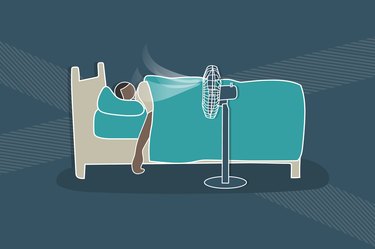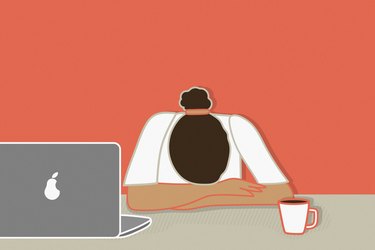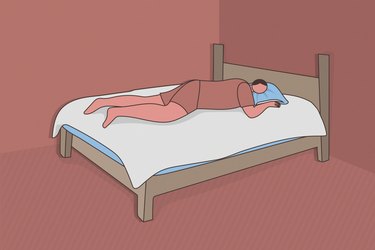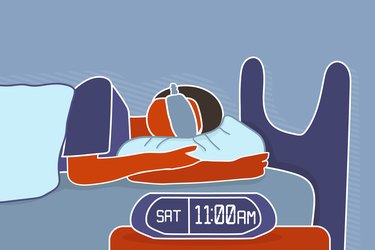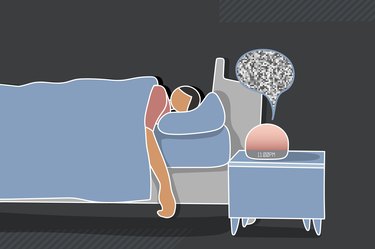
Listening to noise in order to fall (and stay) asleep sounds pretty counterintuitive, right? After all, silence seems like a pretty big part of optimal sleep, alongside darkness and a cool temperature. But what about the effects of white noise on sleep?
Unlike ambient sleep sounds (think: rainfall or ocean waves), white noise is actually created by combining different frequencies to create a wind-like tone, according to sleep specialist Michael Breus, PhD. An easy way to understand white noise? Kind of like how white light is a combo of every color, white noise mixes every sound frequency.
Video of the Day
But can listening to white noise each night become addicting over time? We chatted with Breus to get the scoop on how white noise works, why it's effective and whether or not it can be cause for concern.
White Noise Can Help You Fall and Stay Asleep
Using a white noise machine may actually help you fall asleep more quickly, even for those who have insomnia. An April 2017 study in Sleep found that white noise helped reduce sleep onset latency (the time it takes to fall asleep) by roughly 40 percent.
White noise can also help you stay asleep for longer periods of time, Breus says. When you wake up during the night, it's not necessarily a loud sound that jolts you awake. It's actually the sudden change in noise frequency that rouses you. Because white noise is a combination of all frequencies, it protects your body from being caught off guard by a sound shift, he says.
"White noise reduces the frequency gap between what you're hearing and a sudden loud noise — like a firework going off at night — giving you a better shot of staying asleep," Breus notes.
But just how powerful is white noise? It may even be strong enough to counteract the disruptive (and relentless) noise of New York City streets, according to a July 2021 study in Sleep Medicine. After comparing sleep with and without white noise, researchers found white noise significantly improved sleep for people who struggled with noisy surroundings.
Is White Noise Habit-Forming?
Although most white noise machines are pretty compact and can easily fit in a suitcase while traveling, you may not like the idea of depending on white noise to be able to fall asleep.
There's some good news on this front: Unlike sleeping medication, using white noise doesn't change anything in your brain and isn't addicting, Breus says. But like falling asleep to the television or music, it can be habit-forming.
"It's like anything else — if you get used to it, you will miss it for a period of time when it's gone," he says.
With that said, there isn't necessarily any harm in falling asleep to white noise each night, he says, especially for those who live with noisy roommates or outdoor commotion on the regular.
But if you travel consistently or don't tend to sleep in the same room each night, it can become harder to fall asleep naturally when you don't have white noise in the background.
The Best White Noise for Sleep
Alongside white noise, you can also try pink and brown noise before bed. These work the same as white noise in masking outside noises but are a lower frequency and sound a little different.
There's no one "best" noise for sleep — different people sleep better with different types of noise.
An August 2012 study in the Journal of Theoretical Biology found that pink noise can help promote stable, more restful sleep. Brown noise can have the same benefit, which is why you may want to have a noise machine that can play several types of frequencies, Breus says.
So, How Bad Is It Really to Use White Noise for Sleep?
Although listening to white noise while you sleep may be habit-forming, it technically doesn't have any negative affects.
By masking sleep-disturbing sounds, white noise can actually be a helpful tool for falling and staying asleep, especially if you live in a noisy neighborhood or travel often.
- Sleep: "Effect of Background Noise on Sleep Quality"
- Sleep Medicine: "The Effects of White Noise on Sleep and Duration in Individuals Living in a High Noise Environment in New York City"
- Journal of Theoretical Biology: "Pink Noise: Effect on Complexity Synchronization of Brain Activity and Sleep Consolidation"
Was this article helpful?
150 Characters Max
0/150
Thank you for sharing!
Thank you for your feedback!
Is this an emergency? If you are experiencing serious medical symptoms, please see the National Library of Medicine’s list of signs you need emergency medical attention or call 911.

